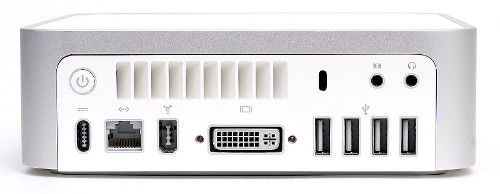|
Size: 1116
Comment: Initial commit
|
← Revision 7 as of 2022-11-21 15:00:33 ⇥
Size: 2675
Comment: Update information for new distros, correct incorrect information about EFI implementation and USB booting
|
| Deletions are marked like this. | Additions are marked like this. |
| Line 1: | Line 1: |
| == Mac mini (2,1), release date: Late 2007. == | == Mac mini (2,1), release date: Mid 2007. == |
| Line 3: | Line 3: |
| {{attachment:IconsPage/ubuntu.png||width=300}} | {{attachment:500px-Mac-mini-dvi-back.jpg||width=300}} |
| Line 14: | Line 14: |
The original systems were sold in two flavors: |
The original systems were sold in two 64-bit flavors: |
| Line 19: | Line 18: |
| Line 22: | Line 20: |
| Mac mini (2,1) will only boot from the internal HDD, internal Super`Drive, or (presumably) [[https://support.apple.com/en-us/HT1661|FireWire target disk mode]]. This means that booting via a USB port '''Does not work'''. | This machine will boot from the internal HDD, internal SuperDrive, or (presumably) [[https://support.apple.com/en-us/HT1661|FireWire target disk mode]], as well as USB. Booting from USB is often very slow, but does work. |
| Line 24: | Line 22: |
| Mac mini (2,1) uses an 64-bit EFI firmware but also support BIOS boot compatibility. However, due to the EFI implementation a Mac mini (2,1) does not handle a BIOS / EFI bootable disk gracefully, usually dropping to the following prompt: | The machine uses 32-bit x86 EFI v1.1 firmware but also supports BIOS boot compatibility. However, due to the EFI implementation, the system does not handle a hybrid BIOS/EFI bootable disk gracefully, usually dropping to the following prompt: |
| Line 31: | Line 29: |
Unfortunately, "Mac" labelled disks aren't available for modern releases of Ubuntu. This is because modern Intel Macs use 64-bit EFI 2.x firmware. In order to boot Ubuntu, you'll have to legacy boot, or modify your installation media to include a 32-bit EFI GRUB bootloader. I am not sure how to get this Mac Mini to legacy boot a USB drive, so your best bet is probably to try a DVD. This [[https://forums.freebsd.org/threads/need-help-installing-on-mid-2007-mac-mini.64977/|FreeBSD Forum thread]] seems to suggest it's not easy to legacy boot from USB, even with [[https://www.rodsbooks.com/refind/|rEFInd]]. == Outdated information below for old versions of Ubuntu == We have three options to get around this. 1. Use an Ubuntu 32-bit '''i386''' install disk. As of this writing, no i386 isos contain EFI bootable binaries. This is not ideal since we would be installing 32-bit software on a 64-bit capable system. 2. Use an Ubuntu 64-bit '''amd64+mac''' install disk. These disks have explicitly removed EFI bootable binaries forcing a machine to boot with BIOS compatibility. '''[Recommended]''' 3. Use the 32-bit or 64-bit [[https://help.ubuntu.com/community/Installation/MinimalCD|Netboot Image]]. As of this writing, the mini.iso for both amd64 and i386 do not include EFI bootable binaries. Though this provide a more rudimentary looking installer, '''this allows you to fully customize your Ubuntu installation'''. == List of Installation Guides == <<PageList(Mac_mini2-1/* mimetype:text/wiki -Mac_mini2-1)>> |
Mac mini (2,1), release date: Mid 2007.

Under Ubuntu, you can verify that this is the model that you have by typing at the terminal:
sudo dmidecode -s system-product-name
This command should output Macmini2,1. Some people seem to have upgraded their original Mac mini (1,1) firmware to Mac mini (2,1). These systems are not covered here.
The original systems were sold in two 64-bit flavors: * Core 2 Duo @ 1.83 GHz (T5600) * Core 2 Duo @ 2.00 GHz (T7200)
Important information for booting
This machine will boot from the internal HDD, internal SuperDrive, or (presumably) FireWire target disk mode, as well as USB. Booting from USB is often very slow, but does work.
The machine uses 32-bit x86 EFI v1.1 firmware but also supports BIOS boot compatibility. However, due to the EFI implementation, the system does not handle a hybrid BIOS/EFI bootable disk gracefully, usually dropping to the following prompt:
1. 2. Select CD-ROM boot type:
Unfortunately, "Mac" labelled disks aren't available for modern releases of Ubuntu. This is because modern Intel Macs use 64-bit EFI 2.x firmware. In order to boot Ubuntu, you'll have to legacy boot, or modify your installation media to include a 32-bit EFI GRUB bootloader.
I am not sure how to get this Mac Mini to legacy boot a USB drive, so your best bet is probably to try a DVD. This FreeBSD Forum thread seems to suggest it's not easy to legacy boot from USB, even with rEFInd.
Outdated information below for old versions of Ubuntu
We have three options to get around this.
Use an Ubuntu 32-bit i386 install disk. As of this writing, no i386 isos contain EFI bootable binaries. This is not ideal since we would be installing 32-bit software on a 64-bit capable system.
Use an Ubuntu 64-bit amd64+mac install disk. These disks have explicitly removed EFI bootable binaries forcing a machine to boot with BIOS compatibility. [Recommended]
Use the 32-bit or 64-bit Netboot Image. As of this writing, the mini.iso for both amd64 and i386 do not include EFI bootable binaries. Though this provide a more rudimentary looking installer, this allows you to fully customize your Ubuntu installation.